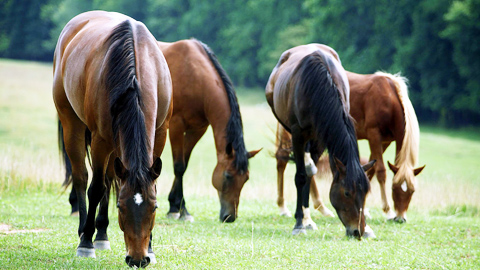
 Today’s interesting post is by Guest Blogger Lucy Pennine
Today’s interesting post is by Guest Blogger Lucy Pennine
When our horses look healthy on the outside, we assume that they’re healthy on the inside too. We go to every pain to care for them, to ensure that when we lay hands on our beloved equines their coats are so soft they feel like satin warmed by the sun, that they shine with a polished lustre, that their hooves are strong, and their forms more perfectly sculpted than any model’s. We enhance their natural beauty and athleticism until they are poetry in motion and we cannot tear our eyes from them. We know that to look and feel their best, they must receive proper nutrition, and most of us are devoted enough to spend hours poring over books and articles and browsing the internet to ensure that we give them the very best of everything.
But sometimes they lose condition inexplicably, leaving us worried and confounded as to how to fix them. We’re right to be concerned by poor body condition. Some people have a tendency to accept weight loss towards the back end of winter, but that’s the wrong attitude to have. If your horse has poor body condition it’s not receiving the nutrients that it needs. This could be caused by an underlying health issue which needs treating, or it may be something you can fix simply by providing a proper diet. You must consider your horse’s behaviour, the environment and your nutritional programme to determine why he fails to thrive.
Feeds and Feeding
To understand what’s going wrong with your horse, start by observing his eating habits. Is he struggling to eat his food properly, causing him to eat less? Dental problems are a particularly common cause of weight loss in older horses, but compromised dentition is relatively easy to remedy. Have an equine dentist check your horse’s teeth and fix any problems. If you have an older horse who has lost teeth or whose remaining teeth are in poor condition, soaked feeds are usually easier to eat and you may want to consider introducing a forage replacer to substitute your hay/haylage rations.
You should also review your horse’s forage. Although you may have all year turnout and ad lib hay/haylage always available in your horse’s stable, check its quality. You can send your hay away to have its quality and digestibility tested, although sometimes your horse will tell you all by himself if it’s not up to scratch by turning his nose up at it.
Finally, you need to make sure that you’re giving the right amount of the right type of feed to your equine. There is no magic formula as every horse’s requirements are a little different. Some are incredibly good doers who need less than recommended; some are very poor doers who need double the amount you would expect. Start by looking at the feeding guide on your feed sacks. They will tell you how much to feed a horse based on size and workload. Begin by feeding the recommended amount, increasing or reducing this based on your horse’s appearance. You might be feeding the recommended amount, but if it is too little for your horse then he will not be receiving the right vitamins, proteins or minerals from the food he eats.
Worming
If nutrition is not the problem but your horse is failing to hold condition, then it’s time to review your parasite control programme. A growing problem is the developing resistance to some types of wormers, particularly in small red worm (cyathostomin) populations. This means that we need to change the way that we think about worming. If you suspect that your horses are no longer adequately protected, have a faecal egg count performed to find whether your horse has contracted any equine parasites. If your worming schedule is no longer working, get in touch with your local feed store or vet to find the ideal programme for your particular area.
Medical Issues
Once you’re certain that your horse is on the right diet and that they are adequately protected by a worming programme from parasites, it’s time to explore whether your horse’s weight loss or lack of condition is attributable to a medical condition. Gastric ulcers and digestive problems are perhaps the most common medical causes of a reduced appetite in horses. So much of having a happy, healthy horse stems from having a fully functional digestive system. Maintaining a healthy gut balance fosters optimal nutrient absorption and a good appetite, contributing to a horse in peak condition.
Horse’s digestive tracts are designed to support a very specific lifestyle where they graze freely in herds for up to 18 hours a day. This lifestyle is low stress and low energy and involves constant consumption and a diet of primarily grass – very different to that of the modern domestic horse. Stalling horses for a large chunk of the day, feeding two or three hard meals and rigorous exercise can mean that, even if your horse appears healthy on the outside, their digestive tract is not getting the support it needs.
There are many supplements available to restore the delicate balance of the digestive system. Get in touch with a company specialising in equine nutrition, such as Equiform Nutrition, to find the best digestive supplement for your horse. If symptoms persist, then it’s time to call your vet.
Meeting his nutritional needs will allow your horse to live a healthier life. A healthy horse will always be a happy horse. If you love your equine, get his diet right; help him to feel as great on the inside as he looks on the outside.
